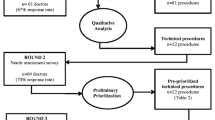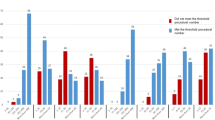Abstract
Background
Published needs analyses of rural surgeons have identified a need for training in the endoscopic management of non-variceal upper gastrointestinal bleeding (NVUGIB). The study aim was to survey rural surgeons regarding their requirements and preferences for a simulation model on which they could rehearse the endoscopic management of NVUGIB.
Methods
Rural surgeons were contacted via the American College of Surgery Advisory Council listserv and invited to complete an online survey.
Results
A total of 66 responses were received, representing all 4 US regional divisions. Seventy-seven percent of respondents perform > 100 endoscopy cases per year. A majority have no experience with simulation models (77%), citing cost, time, and access to training courses as the three most limiting factors. Thirty-three percent lacked confidence in managing UGIBs, and 73% were interested in receiving additional training. Preference analysis revealed that respondents preferred a portable simulation model (81%) that costs between $500 and $1000 (46%), and requires 1–2 weeks of training (34%). Verbal feedback from an expert was viewed as the most helpful type of feedback (61%).
Conclusion
Rural surgeons frequently perform flexible endoscopy in their practice and are interested in further training for the endoscopic management of NVUGIB. These results will be used to develop a simulation platform for training in the endoscopic management of NVUGIB that meets rural surgeons’ needs.



Similar content being viewed by others
References
Lynge DC, Larson EH (2009) Workforce issues in rural surgery. Surg Clin North Am 89:1285–1291. https://doi.org/10.1016/j.suc.2009.07.003
Sarap M (2014) Advanced surgical techniques for rural surgeons. Springer, New York.
Halverson AL, Hughes TG, Borgstrom DC, Sachdeva AK, Darosa DA, Hoyt DB (2013) What surgical skills rural surgeons need to master. J Am Coll Surg 217:919–923. https://doi.org/10.1016/j.jamcollsurg.2013.07.001
Deal SB, Cook MR, Hughes D, Sarap M, Hughes TG, Brasel K, Alseidi AA (2018) Training for a career in rural and nonmetropolitan surgery—a practical needs assessment. J Surg Educ 75:e229–e233. https://doi.org/10.1016/j.jsurg.2018.07.013
Matthes K (2006) Simulator training in endoscopic hemostasis. Gastrointest Endosc Clin N Am 16:511–527. https://doi.org/10.1016/j.giec.2006.03.016
Zuckerman R, Doty B, Bark K, Heneghan S (2007) Rural versus non-rural differences in surgeon performed endoscopy: results of a national survey. Am Surg 73:903–905.
Thompson MJ, Lynge DC, Larson EH, Tachawachira P, Hart LG (2005) Characterizing the general surgery workforce in rural America. Arch Surg 140:74–79. https://doi.org/10.1001/archsurg.140.1.74
Haycock AV, Youd P, Bassett P, Saunders BP, Tekkis P, Thomas-Gibson S (2009) Simulator training improves practical skills in therapeutic GI endoscopy: results from a randomized, blinded, controlled study. Gastrointest Endosc 70:835–845.e2. https://doi.org/10.1016/j.gie.2009.01.001
Hochberger J, Matthes K, Maiss J, Koebnick C, Hahn EG, Cohen J (2005) Training with the compactEASIE biologic endoscopy simulator significantly improves hemostatic technical skill of gastroenterology fellows: a randomized controlled comparison with clinical endoscopy training alone. Gastrointest Endosc 61:204–215. https://doi.org/10.1016/S0016-5107(04)02471-X
Acknowledgements
This investigation was supported by the University of Utah Population Health Research (PHR) Foundation, with funding in part from the National Center for Research Resources and the National Center for Advancing Translational Sciences, National Institutes of Health, through Grant 5UL1TR001067-05 (formerly 8UL1TR000105 and UL1RR025764)
Author information
Authors and Affiliations
Corresponding author
Ethics declarations
Disclosures
Dr. Brian Dunkin is employed by Boston Scientific. Drs. Shawn Purnell, Daniel Vargo, Michael Sarap, Joseph Nguyen-Lee, and Chelsea Allen have no conflicts of interest or financial ties to disclose.
Additional information
Publisher's Note
Springer Nature remains neutral with regard to jurisdictional claims in published maps and institutional affiliations.
Rights and permissions
About this article
Cite this article
Purnell, S.M., Vargo, D.J., Sarap, M. et al. Simulation training for the endoscopic management of upper gastrointestinal bleeding: a nationwide survey of rural surgeons’ needs and preferences analysis. Surg Endosc 35, 333–339 (2021). https://doi.org/10.1007/s00464-020-07405-x
Received:
Accepted:
Published:
Issue Date:
DOI: https://doi.org/10.1007/s00464-020-07405-x




